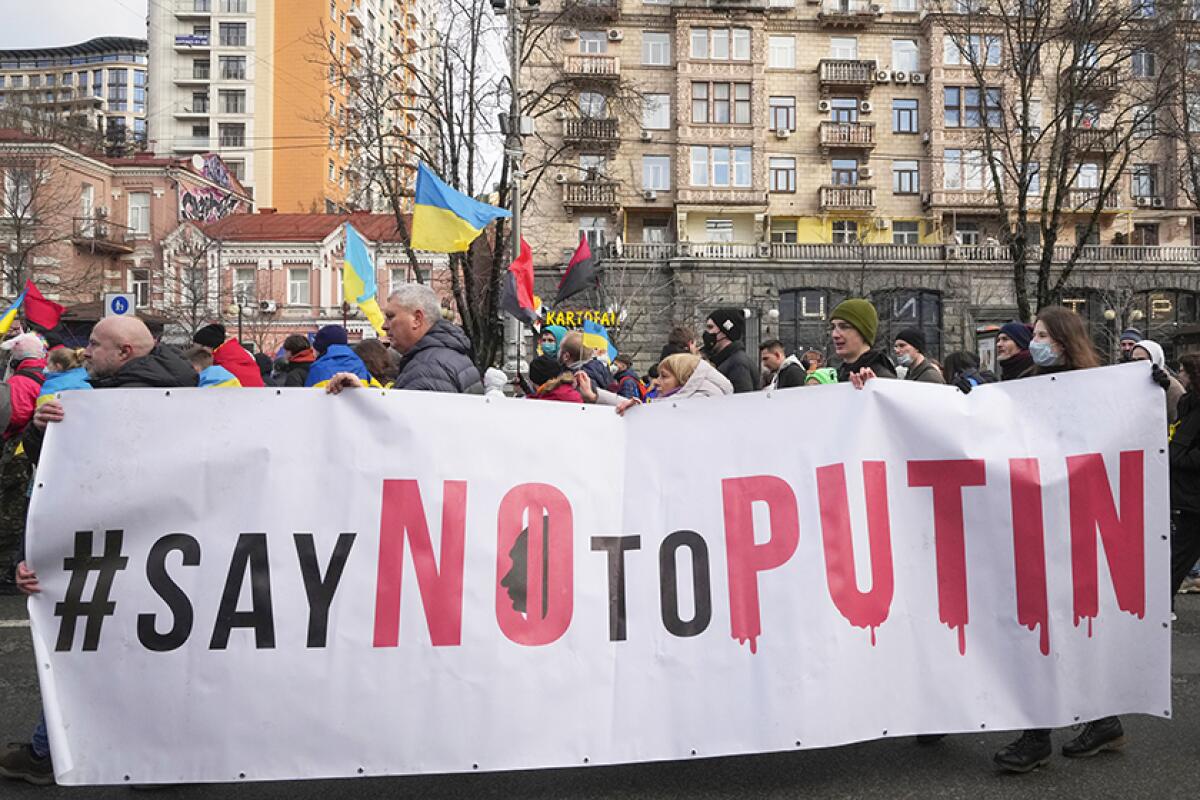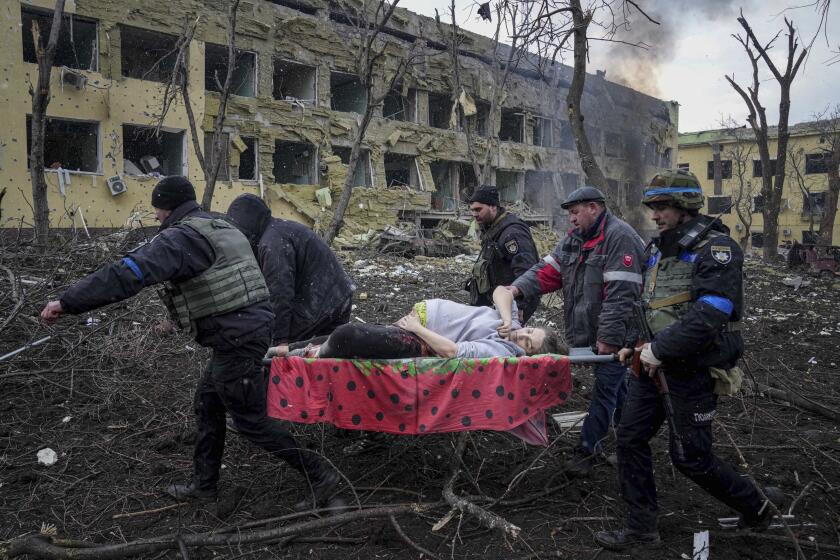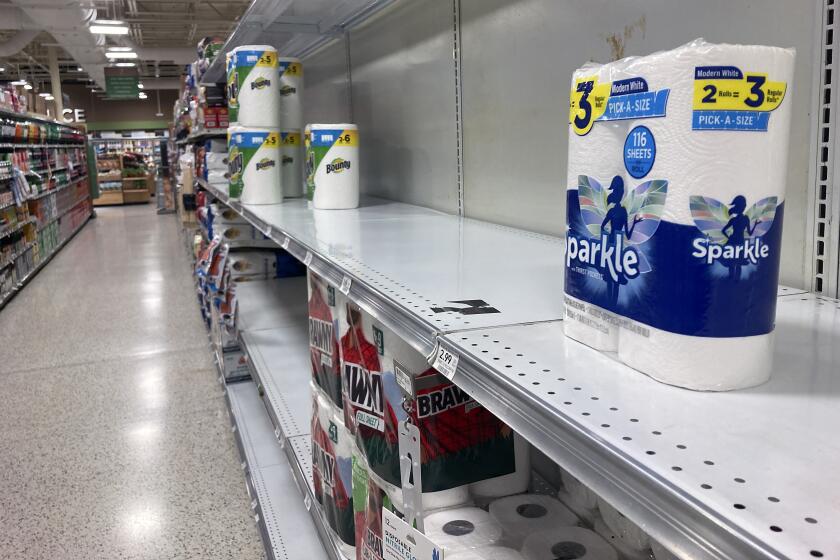Column: The tentacles of Putin’s propaganda reach my doorstep in Venice Beach

- Share via
The repairman was extremely fit and had a distinctive accent.
“Where are you from?” I asked, making small talk, the way I do with most people who come to my Venice home to fix what breaks.
“Russia,” he replied.
“That must be tough right now,” I said.
“Everybody hates us,” he said with a shrug.
Later, he took out his phone to share a photo of some Ukrainian neo-Nazis to prove that Americans have it all wrong about Russian President Vladimir Putin, who has said he wants to “denazify” Ukraine.
I am aware that Ukraine has its own far-right neo-Nazi paramilitary groups. Like our very own homegrown neo-Nazi groups, they may get a lot of attention, but that doesn’t mean the country is teeming with Nazis.
Anyway, I was not up to debating history with someone whose worldview was so jarring to me.
Until that moment, I had just assumed that Russians living outside of Russia, with access to factual coverage of the war instead of pro-Putin propaganda, would agree that the war is a misguided and brutal assault on the people and sovereignty of a neighboring state.
Perhaps I was misled by a story last month about two USA Today/Suffolk University polls, which found that nearly all of the U.S. residents who identified their heritage as Russian or Ukrainian were united in their opposition to Putin’s war. (The poll included 1,000 people, divided equally between those who said their heritage was Russian and those who identified as Ukrainian.)
Or maybe I forgot about the influence of dictator-friendly figures like former President Trump, who described Putin’s invasion as “genius,” and Tucker Carlson, who publicly wondered why he should oppose it and has amplified false Russian claims about the U.S. funding bioweapons labs in Ukraine.
But it does seem that most of the world is on Ukraine’s side and that Russian Americans, far from supporting Putin, are instead worried about being blamed for his aggression. Ukrainian Americans have worried about being mistaken for Russians. In story after story, we’ve read about businesses victimized by ignoramuses who see the word “Russian” and reflexively strike out, often at fellow American citizens.
The photo shows a heavily pregnant and bleeding woman being carried from a bombed-out maternity hospital.
In West Hollywood, the heart of this region’s Russian-speaking community, Rina Atroshenko has changed the menu of her restaurant Traktir. It no longer boasts of serving “authentic Russian cuisine.” Instead, its menu and website tout “Eastern European cuisine.”
This sort of thing is happening all over the country.
In New York City, the owner of the Russian Samovar restaurant told the Insider that she and her employees have been harassed over the phone and online, and she has had to hire security guards. “We were called fascists and Nazis on the phone,” said Vlada Von Shats. She said people have left one-star reviews online, and her business is down 60% since the war began, despite an unambiguous message of support for Ukraine on its homepage.
One hard lesson from two years of COVID? The public spiritedness we naively believed to be an American virtue was nothing more than a myth.
And Toronto’s Moscow Tea Room has closed its doors for “rebranding.”
I know what it’s like to live in a place where your home country is reviled.
During the height of the Vietnam War, my family lived in France. My father, a professor, had received a Fulbright scholarship. We’d originally been meant to spend a year in Amman, Jordan, but the Six-Day War broke out, and the Middle East was off the table. My parents were given a choice: France or Austria. They chose France, and in the fall of 1967, we moved to Pau, a university town in a southwest corner of the country.
My folks were ardently liberal and antiwar, and they often took the four of us kids to anti-Vietnam War marches. Our year abroad was no different. I remember walking with them in a cold drizzle in a big demonstration against the war. We were taken aback when we realized that, all around us, people were chanting “Yankee, go home!” We didn’t take the insult personally, because we too supported getting the U.S. out of Vietnam. (I was too young to understand the irony of America making the same mistake in Vietnam that France already had.)
Whether it’s the misbegotten American involvement in Vietnam, the invasion of Iraq under false pretenses, the failure to intervene in the Rwandan genocide or the botched withdrawal from Afghanistan, it’s my birthright as an American to disagree with my government.
As I handed the repairman a check, he mentioned that he used to work out nearby.
“Oh,” I said, “you must know Arnold Schwarzenegger.”
He scowled.
“I don’t like him anymore,” he told me. “He was talking about vaccines and said, ‘Screw your freedom.’ ”
Indeed, last August, Schwarzenegger was brusque about resistance to anti-COVID measures.
“There is a virus here; it kills people,” the former governor told CNN’s Bianna Golodryga. “The only way we prevent it is get vaccinated, get masks, do social distancing ... and not just to think about, ‘Well my freedom is being kind of disturbed here.’ No, screw your freedom.”
Freedom, said the repairman, “is why we came here.”
Then how, I wanted to ask, can you support taking someone else’s away?
More to Read
A cure for the common opinion
Get thought-provoking perspectives with our weekly newsletter.
You may occasionally receive promotional content from the Los Angeles Times.














